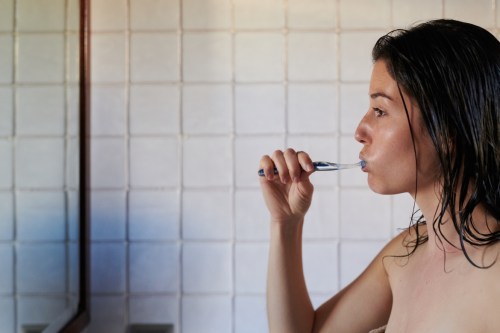Our editors independently select these products. Making a purchase through our links may earn Well+Good a commission
Skipping Just *One Day* of Brushing Your Teeth Is a Big Mistake
A recent study found that going just one day without brushing your teeth significantly impacts your oral health.

Hygiene during the pandemic is strange. You wash your hands like you’re preparing to perform surgery, but you’re wearing the same sweatpants for the third day in a row. (Balance?) But if one of the habits you’ve been slacking on is brushing your teeth, it’s time to get back into the brush-twice-a-day groove. A recent study found that going just one day without brushing your teeth significantly impacts your oral health.
Experts in This Article
Peter Vanstrom, DDS, PC, FAGD is a dentist in Atlanta, Georgia where he owns his own practice, Artistic Dentistry of Atlanta.
Sonia Kohli, DDS, is a cosmetic dentist in New York City.
“The study actually confirms what the American Dental Association and the American Periodontal Association have suggested for years,” says Peter V. Vanstrom, DDS, PC, a dentist in Atlanta. In a healthy mouth, the good bacteria keeps the bad bacteria in line, he explains. But bad bacteria begin to overpower the good bacteria surprisingly quickly. “Plaque that causes gingivitis can accumulate and become destructive within four to 12 hours after brushing.”
But what exactly is this bad bacteria actually doing? “What happens is that bad bacteria festers in your mouth for hours and eats away at the remnants of the food and the debris that’s left in your mouth because of not brushing,” says Sonia Kohli, DDS, a cosmetic dentist in New York City. Ah, “festers.” Not the adjective you want used in reference to your mouth. The bacteria also release acids that enhance tooth decay, and can cause gum disease if you don’t brush your teeth for a long time.
“The good news is that the initial 24-hour build up of plaque that may have accumulated is easily removed with proper brushing and flossing,” says Dr. Vanstrom. He recommends brushing twice a day with a sonic toothbrush, like Curaprox Hydrosonic Pro, $200. (There are plenty of other budget-friendly dentist-approved electric toothbrushes.)
Let’s say you somehow find yourself stranded without a toothbrush. All hope is not lost, as there are several actions you can take if you know you aren’t going to be able to brush your teeth for a while. Dr. Vanstrom says that when he forgets to pack his toothbrush for a trip, he washes his hands really well and used his finger to scrub his teeth, and then rinses with mouthwash. (Shout out to everyone else who has done this in a guy’s dirty, hand towel-less bathroom after an unexpected sleepover—we had the right idea about that, at least.) Dr. Kohli adds that using floss and mouthwash can also help get rid of bacteria in your mouth.
If you know you are going to go a while without brushing your teeth, Dr. Kohli says to eat vegetables—the crunchier the better, as the crunchier they are the less likely they are to stick to your teeth. Try your best to avoid sugar, too. She also says you can snack on some cheese (best news ever), because it helps your mouth produce saliva, and saliva helps prevent cavities. Sugarless gum is another option that helps increase saliva production. But remember: nothing replaces a good toothbrush.
Oh hi! You look like someone who loves free workouts, discounts for cult-fave wellness brands, and exclusive Well+Good content. Sign up for Well+, our online community of wellness insiders, and unlock your rewards instantly.
Sign Up for Our Daily Newsletter
Get all the latest in wellness, trends, food, fitness, beauty, and more delivered right to your inbox.
Got it, you've been added to our email list.










